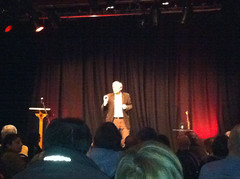Common lies of social software
 I've been thinking about this for a little while, spurred on by a combination of The Real Life Social Network (an excellent slideshow from a Googler) and going to see Robin Dunbar talk at the Ropetackle Centre back in February.
I've been thinking about this for a little while, spurred on by a combination of The Real Life Social Network (an excellent slideshow from a Googler) and going to see Robin Dunbar talk at the Ropetackle Centre back in February.
Dunbar was fun. Some highlights from my notes (which I forgot to post here at the time):
- Dunbar's number pops up everywhere: early hunter/gatherer clans were 150. Average village size in the Doomsday book was 150 (except in Kent, where it was 100). Hutterites split communities when they hit 150, because that's the point where they think you start needing a police force - and they want to avoid hierarchies;
- Urbanisation prevents coherent social communities: your 150 are scattered and you end up with isolated groups of friends, places to hide yourself from the unblinking gaze of your 150 - which leads to mischief;
- Lifelong monogamous relationships require computational brainpower: larger brained birds tend to be lifelong pair-bonders; the next biggest are annual pair bonders. This is driven by the need for bi-parental care: they need to coordinate to do it well;
- Primates have usefully generalised this pair-bonding to create friendships. They developed the skill of modelling the mental processes of others to help with this;
- Friendships deteriorate over time fast, without investment in them. By contrast, kinship deepens over time;
- Those from large extended families have fewer friends: your 150 gets filled kin-first;
- Military structures conform to Dunbar numbers: a section of 15 men, a platoon of 35-50, a company of 150, a battalion of 350. The seriousness of military endeavour means it's important to get coordination right. The company is the primary unit of loyalty in the military; most competitive sports are between companies;
I've been mentally collecting "lies of social software" since then, if that doesn't sound too melodramatic. So far I've come up with these, mainly based on my experiences with blogging, Flickr, Twitter and Facebook:
- "Your friends are equally important". Dunbar pointed out that we have concentric circles of friends: 5 close ones, 15 acquaintances, 50 rough friends, etc. Yet in my friends lists on Twitter and Facebook, everyone's equal (and usually alphabetical). I like what Path have done around limiting the size of your network, and the Flickr concept of Family, Friends and Contacts - but what about software for just you and those 5 of your closest? Or for you and your other half?
- "Your friends are arranged into discrete groups", with a corollary that these groups rarely change. Managing lists of friends is unpleasantly icky. I bet Google or Facebook could take away much of the pain of creating these lists by analysing my flow of communications. I bet they could notice and prompt me to confirm changes ("you're emailing Freda a lot at the moment - working late or is she a friend outside work nowadays?"). Perhaps the challenge is less technical and more how to present this to a privacy-concerned public;
- "You can manage hundreds of friends". Dunbar talked about Facebook offering circles of friends beyond the sizes our brains would naturally sustain, and mentioned that conventional friendships need sustaining interactions. I asked whether software might act as a friend-ship sustaining interaction in the absence of physical nearness - i.e. as a prosthetic primate-grooming tool. His suspicion was that without some physical contact even virtual friendships will fade, but virtual contact would slow this degradation. Conversely, in the real world, friendships don't last forever: why do we insist that they do in the virtual world? I don't know of any social network that times them out in the absence of contact;
- "Friendship is reciprocal and equal". Some people are more important to me than I am to them, and vice versa; we might not like to face up to this in every day life but it's true nonetheless, and our digital tools don't reflect this. More than that, commuting relationships into binary leaves them unhelpfully stark: what room for plausible deniability in a world built on flippable but certain bits?
I think that if we're going to use software for social purposes in future (that is, to mediate, extend or substitute our social relationships), we'll need to start fixing some of these bugs in the current implementation. I'm having some fun thinking about playful ways this might be done...